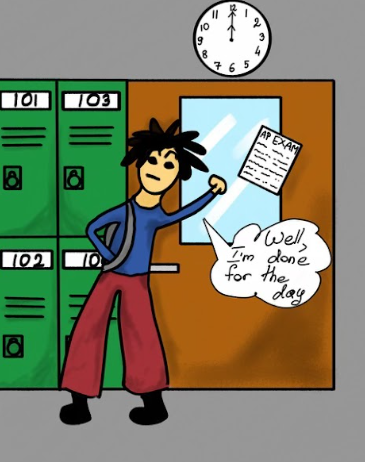It is time to face it: AP tests absolutely decimate students’ brains. Whether they have thoughtfully studied all year or furiously crammed the night before, everyone comes out of exam week as zombies. Junior Jameson Morrissey puts it best: “You are mentally drained.” Morrissey explained that no matter how studious one may be, it is practically impossible to be active in class after three hours of rigorous AP testing. Communicating with students prior to the exam is not any easier; they all are actively cramming, trying not to let a single spec of information sneak away from their jam-packed craniums, too stressed to function, or have simply surrendered to what the future may bring.
Unsurprisingly, the majority of AP test takers wind up either mysteriously appearing from the void right before their exam or disappearing right afterwards. Most students merely glance at their attendance history to ensure that they will not NC (otherwise known as no credit) a class if they have another absence and decide that it is best if they simply do not show up to their classes, recognizing that it would be pointless. Afterall, how can one expect students to place all of their focus on a lesson after they just fried their brains over a test that has the power to decide whether they must drag themselves through the same course once they enter college? After all, it is not as if that content could not wait one more day, especially since it is a well known fact that AP classes struggle to find something to keep themselves occupied after exams. Senior Noah Berrios noted, “Tons of students take a half day after AP exams.” Thus, the current attendance policy is, in fact, not effective. Even though students are currently still expected to attend all their classes, they feel that staying at school does them more harm than good, so much so that they skip anyway.
Kelsey Roth, a junior, brings up this ever-important fact: “[An] AP exam also provides students with a chance to get college credit.” This credit may seem insignificant in the grand scheme of things if you only take one or two AP courses, but if a student puts in the effort to challenge him/herself with several accelerated courses, it could easily mean the difference between shaving off an entire semester or spending thousands of additional dollars unnecessarily. In fact, the results of the AP tests even possess the power to influence the application decisions of schools that students consider or even choose to apply to. If students highly value receiving credit and not having to pointlessly take the same course twice, they will be more likely to lean towards universities that accept their scores. Should high schools not do everything in their power to assist their students so that they may have this head start, or at the very least not impede their ability to do so by requiring them to be present in every single class they are enrolled in? Regardless, junior Katerina Christakos adds how stress stemming from AP exams impacts everyone who takes them, not just those who are looking to save a little spending: “Even those who may not necessarily place a high value on their AP exam scores can still feel overwhelmed by the perceived difficulty and importance of these exams due to the emphasis placed on them.” Students place so much importance on the AP exams that they spend countless hours dedicating themselves to memorizing the content material so that they may receive a good score. For instance, Roth takes her studies very seriously, explaining that she attends review sessions and studies many weeks in advance for the exam, on top of her immediate coursework and extracurricular activities. Is it truly fair to expect a student to, on the day of, push these exams aside and instead focus on an assignment that will have virtually no impact on them in a week’s time?


















